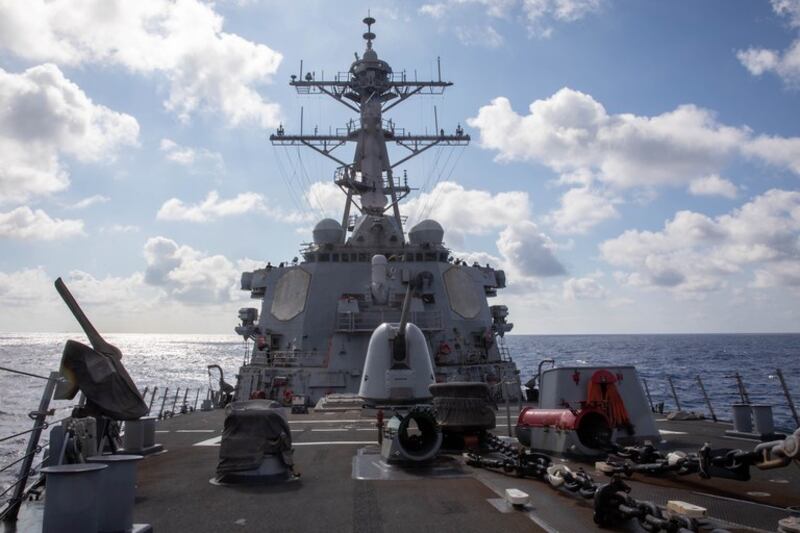Russia’s invasion of Ukraine has brought U.S.-China frictions to the fore with no end in sight, analysts warned, while a former Asian leader cautioned about the risk of a new world war.
The war in Ukraine and its potential ripple effects in the Indo-Pacific region was a hot topic at the Future of Asia conference in Tokyo hosted by Nikkei Inc. last week.
Mahathir Mohamad, Southeast Asia’s senior-most statesman, conveyed a warning as he addressed the conference.
“I am afraid that wars have a habit of beginning small and then grow into world wars,” the former Malaysian prime minister said.
Mahathir, now 96, served as PM from 1981 to 2003 and again from 2018 to 2020. He was 20 when World War II ended.
Meanwhile, Chinese and U.S. analysts who attended the conference traded accusations against each other’s countries and their roles in trying to resolve the conflict in Ukraine.
China and Russia share a common interest in weakening U.S. global influence and they “seek to change the international order,” said Bonnie Glaser, director of the German Marshall Fund of the United States.
Before Russian invaded Ukraine, she reminded the audience at the conference, it was reported that the U.S. had shared intelligence with China about Russia’s military plan and urged Beijing to intervene to prevent the war, only for China to share that intelligence with Moscow.
This “underscores how much mistrust is there between the U.S. and China,” Glaser said.
In response Jia Qingguo, professor at the Peking University’s School of International Studies, said the difference between China and the U.S. is that Washington is seeking an ideological world order while Beijing is seeking a secular one “based on national sovereignty and territorial integrity.”
It is the U.S. that has been trying to contain China, Jia said.
China does not endorse Russia’s military attack against Ukraine but is sympathetic to Moscow being pushed by NATO’s possible expansion, the Beijing-based professor said, adding: “Never push a country, especially a big country, to a corner, however benign the intentions are.”
“Countries should respect each other,” Jia said.
Regarding that statement, the German Marshall Fund’s Glaser argued that China has been showing double standards when it comes to the definition of “respect.”
“When countries have put their own interests ahead of Chinese interests, [which] has been interpreted by Beijing as disrespect,” she said.
As the war drags on, “rather than be a strategic partner for China, Russia will become a burden,” Glaser predicted.
“One possibility is that the U.S. will be freed up to some extent to focus even more intently on the competition with China and on cooperation with allies and partners in the Indo-Pacific region,” the American analyst said, pointing out that officials in the Biden administration believe “that is the most likely outcome.”
Veteran diplomat Bilahari Kausikan, who is a former permanent secretary to Singapore’s foreign ministry, said the key issue at present is U.S.-China relations.
“China has been put in a very awkward situation. It has no other partner of the same strategic weight as Russia anywhere in the world,” he said.
Speaking from the perspective of Southeast Asian countries, Kausikan said geopolitics are “moving in the direction of the West” but “if you insist in defining this conflict as a fight between totalitarianism and democracy you’ll likely make that support more shaky and shallow.”
“Not every country in this region finds every aspect of Western democracy universally attractive. Nor do they find every aspect of Chinese authoritarianism universally unappealing,” he argued.
Former Malaysian PM Mahathir seemed to echo the Chinese government’s stance when describing the attitude of the U.S. as “always to apply pressure to force regime change.”
“When people do not agree, the U.S. would show that it may take military action,” he said. “That is why there is a tendency for tension to increase whenever it involves the U.S.”

Taiwan question
Experts at the Tokyo conference also discussed the possibility of a conflict involving Taiwan, which China considers a breakaway province that should be reunified with the mainland.
According to Jia Qingguo, there should be no comparison between Ukraine and Taiwan.
“No country has the right to support some residents of another country to split the place in which they live away from that country,” he said.
“China has every right to make sure that Taiwan will not be split from China.”
For her part, Glaser said China’s military was, without doubt, following the war in Ukraine closely.
“There are some differences between Taiwan and Ukraine and it’s not a perfect analogy but there are lessons to be drawn.”
“Russia has far greater military capabilities than Ukraine but the Ukrainian resistance has been fierce and I wonder if the PLA has actually anticipated a possibility of facing a fierce resistance in Taiwan,” Glaser said.
She said she hoped Taiwan would also draw some lessons from the conflict in Ukraine and develop its own defense capabilities in the face of security threats from China.

